|
It's an unfortunate fact of art that if a director makes even one great film early in his or her career, then everything else they subsequently put their name to runs the risk of being negatively judged against it, particularly if the newer film wanders into territory already staked out by the earlier classic. This is how a compelling and thoughtful work like Bringing Out the Dead found itself unfavourably compared to Taxi Driver on its release for the simple reason that it was the work of the same director and screenwriter and painted a similarly dour picture of street-level New York life. Yet while I'll freely admit that the later movie lacks the ferocious anger and cinematic gut-punch of Taxi Driver, I'd argue that Bringing Out the Dead is a tonally different film with its own specific concerns, and is still a stronger and more socially relevant work than much of Martin Scorsese's subsequent output. See, I'm doing it now.
Few filmmakers had a bigger impact on 70s American cinema than Francis Coppola, who didn't just make a single classic movie but four in a row, namely The Godfather, The Conversation, The Godfather, Part II and Apocalypse Now, masterpieces all. By the end of the decade it was clear that this was a director who could do no wrong, then in 1981 he literally threw everything he had and more into One From the Heart, a dizzyingly ambitious rethink of the Hollywood musical whose $2 million budget quickly ballooned to over $25 million. Its box-office failure led to Coppola declaring bankruptcy with debts of several million dollars, which he paid back over the course of the next ten years by taking on whatever even slightly interesting projects were thrown his way. This led to some entertaining and sometimes seriously creative films (the first two were The Outsiders and Rumble Fish, for pity's sake), but also a few that have divided opinion – yep, it's time to give The Godfather, Part III a mention – and nothing that climbed the lofty heights of his 70s classics, an opinion on which I have no doubt I will be vociferously challenged.
In 1987 Coppola directed Gardens of Stone, which was adapted by screenwriter Ronald Bass from the novel by former war correspondent Nicholas Proffitt. On the film's release, the simple fact that it was set during the Vietnam war inevitably invited negative comparisons to Apocalypse Now, despite being a clearly different movie with different objectives and interests. Here, the war remains a distant but crucial background detail, casting a shadow over the action without being shown, save for some late film news footage playing briefly on TV. This proves to be both a strength and a potential weakness, a distinctive approach to what was then a well-worn subject for American cinema but whose effectiveness today relies on our familiarity with specifics of a war that a younger modern (and particularly non-American) audience has no direct connection to.
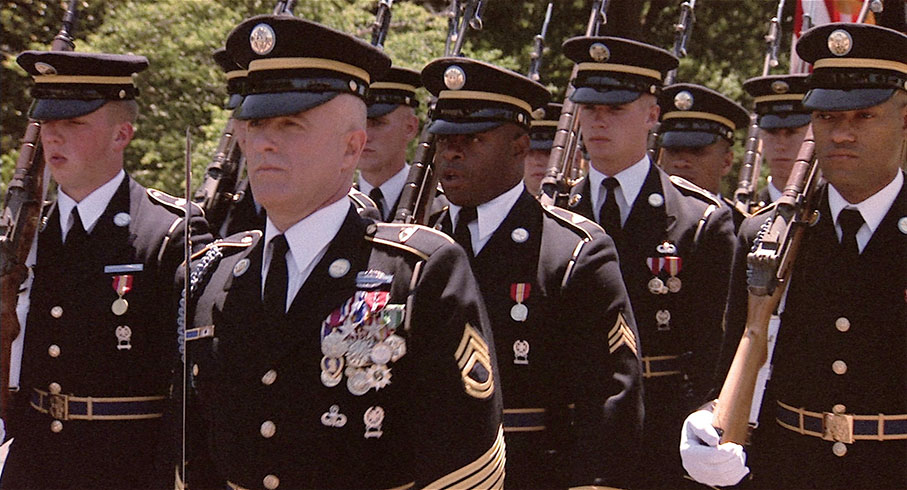
The title is a reference to the Arlington National Cemetery, a burial ground for fallen soldiers where ceremonial duties are carried out by an army division known as the Old Guard. Stationed there is Sergeant First Class Clell Hazard (James Caan), a Korean and two-tour Vietnam War veteran with an intense dislike for his current posting and who aches instead to be working as an instructor at Fort Benning training new recruits who are being sent off to war. When Jackie Willow, the son of a fellow veteran that Clell was close to in Korea, is assigned to the platoon, Clell takes a special interest in his welfare and future. But while Clell believes that the war is unwinnable and a waste of young lives, the zealous Jackie is desperate to rise through the ranks and be reassigned to a frontline platoon.
Gardens of Stone is one of those films (I seem to have been covering a lot of these recently) whose ending is signposted some time before it arrives and is even clearly foreshadowed in the opening scene, though whether you recognise it as such will depend on the keenness of your powers of recall. The interest, however, lies in the journey on which the film takes us to get there and Clell's existing relationships with others and those that he forms during the course of the story. My favourite has to be the almost rank-ignoring bond he has with his immediate superior, Sergeant-Major 'Goody' Nelson, who is played with genuine warmth and authority by the ever-splendid James Earl Jones. Everything about how these two behave in each other's company speaks of a friendship that is long-standing and built on mutual respect and trust. This is illustrated early on in their easy banter during a short expositional sequence in which Goody is distractedly playing solitaire, and in how they interact with each other during a dinner party thrown by Clell to which Goody has been pressured to attend. Yet for me the strength of their relationship is most deftly captured in an almost throwaway moment later in the story when they both approach Jackie to hand him his Lieutenant bars, flanking him and squishing him from both sides with their shoulders first, a playful move that you just know needed no planning and is something that two friends would instinctively do in perfect harmony.
Considerably more tempestuous is Clell's relationship with his commanding officer, Captain Homer Thomas (Dean Stockwell), who repeatedly turns down Clell's transfer requests and makes it clear that his attempts at disruption will only ensure that he is kept in his current posting indefinitely. Counterbalancing this is Clell's romancing of Samantha Davis (Angelica Huston), a Washington Post reporter and anti-war activist who lives in the same apartment block as him, which gets off to a hesitant start but strengthens rapidly as the film progresses. This is mirrored by Jackie's reconnection with his former girlfriend Rachel (Mary Stuart Masterson), whose family has recently moved to Washington and whose former Army Colonel father (Peter Masterson, Mary Stuart Masterson's actual father) effectively sabotaged their earlier wedding plans because he disliked the idea of his daughter marrying beneath her. Within the barracks Jackie also forms a bond of sympathy with fellow recruit Wildman (Casey Siemaszko), whose incompetence infuriates his superiors and whom the by-then model soldier Jackie volunteers to mentor.
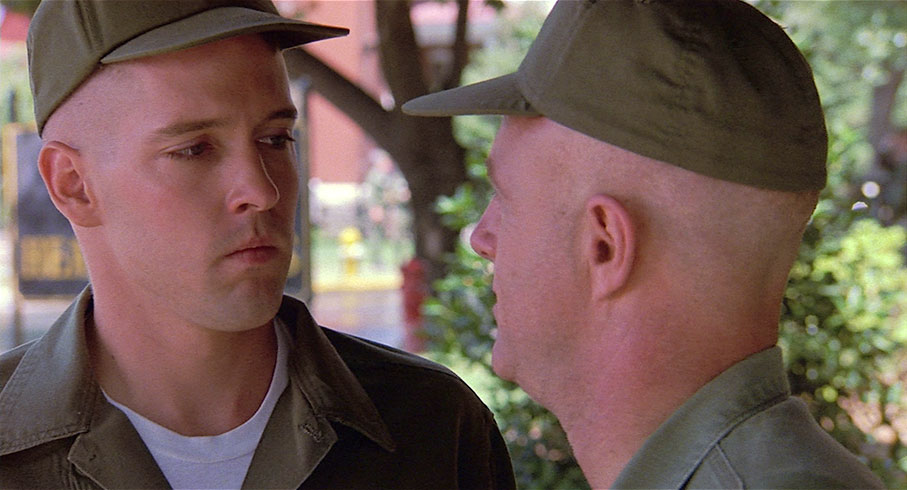
That a father-son bond will develop between Clell and Jackie and that it will prove central to how the narrative unfolds is inevitable from the start, as a letter from Jackie to Clell that has clearly been written after the events that we are about to witness have played out is read on the soundtrack by its author. We learn via some pleasingly unforced exposition that Clell remains pained by the circumstances that led to him being estranged from his own son, and a letter he receives from Jackie's father requesting that he keep an eye on his boy seems to seal the deal. As with his relationship with Samantha, Clell's initially hesitant connection to Jackie intensifies over the course of the story in spite of their differing viewpoints about the war. Indeed, their animated conversations on this subject prove to be some of the most telling in the film, and are enlivened further by the fact that only one of them has any first-hand experience of the war. "I know this unit in 'Nam," Clell tells the overly eager Jackie early on. "They print up these little cards. They say, 'Killing is our business, and business is good'. Well, here, burying is our business. Our business is better."
When Indicator first announced that it was releasing Gardens of Stone on Blu-ray my interest was piqued, in part because I hadn't seen the film since its initial release and I was unable to recall any specific details beyond a vague memory that it was OK, which is almost as damning as saying I didn't like it. Watching the film again twice in two days, I had a similarly non-committal response, enjoying many things about it without becoming particularly excited by any of them. Films such as these are the hardest to review, as they give you little to wildly enthuse over but also nothing to get on your high horse about. The review thus did not progress with the sense of purpose it should have or at any great speed, and I eventually hit a point where I found myself irritated by my inability to pin down why I wasn't as fired up about the film as filmmaker and critic Jim Hemphill is in his enthusiastic and persuasively argued commentary on this very disc. I thus sat down with the film for a third (well, technically fourth) time, taking on board the points made by the learned Mr. Hemphill, and tried once again to fathom what it was that stopped me from seeing greatness in what I regarded as a pretty good film. This time, I think I understood, and in the process gained a better appreciation for its very real strengths, but also a clearer understanding of why – for me and perhaps me alone – these strengths do not quite coalesce into completely satisfying whole.
There's certainly much to be said for the ambition of having so many threads to the story rather than focussing exclusively on the journey of a single protagonist, and although the film is primarily about Clell it is not exclusively about him – when Jackie and Rachel go out on their first date, Clell is pushed into the background, despite having funded their night out and even loaned the deperate Jackie his car. The downside of this approach is that it limits the amount of time Coppola is able to spend on each strand of the story, and stripped of the more luxurious running times of his first two Godfather movies, some elements are not developed as thoroughly as could have been and occasionally fall victim to narrative shortcutting, which kicks against the admirable subtlety on display elsewhere. Thus, the development of Clell and Samantha's blossoming romance occurs in skips and jumps, with the result that we are left to fill in some of the gaps between their first dates and Samantha's later emotional embrace and cry of, "I love you so much!" That they fell so deeply for each other is not an issue, it's just that I hadn't spent enough time in their company to be aware that they were so seriously involved at this point in the story, and thus did not respond as strongly to this moment as I probably should have. Even more stripped-to-the-bone is Jackie's patient tutoring of the bungling Wildman, which has echoes of the one between privates Joker and Pyle in Full Metal Jacket but is afforded so little screen time that it can't help but feel a little anaemic by comparison.
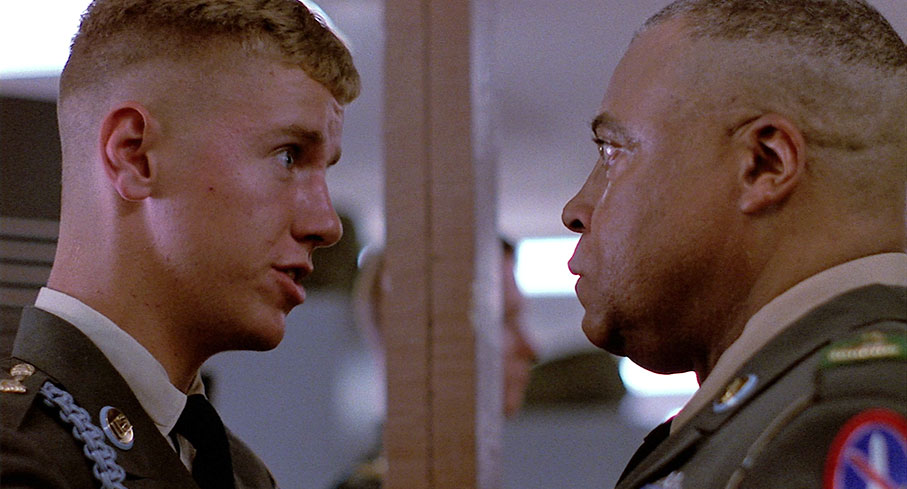
The film's fascination with military ritual is certainly infectious, and adds to an overriding air of realism that occasionally stumbles when it comes to Jackie's perhaps too-cosy relationship with his immediate superiors. The first of these occurs when Sergeant Flanagan (Larry Fishburne) loses his rag at Wildman and makes a move to slap him, only to have his arm grabbed by Jackie, who then offers to work with Wildman because the sergeant "probably has better things to do." While I don't want to keep harking back to the same reference movie, I instantly wondered how Full Metal Jacket's Sergeant Hartman would have reacted to having his arm grasped by a subordinate when in full swing. One thing I can be sure of, it wouldn't have been pretty. Flanagan, however, just glares at Jackie and says in seemingly tortured agreement, "Yes, I've got better things to do" and walks away. If I didn't know better, I'd swear that Willow has used a Jedi mind trick on him.
An equally suspect encounter occurs during a barracks inspection when Jackie responds to a snarled question from Goody about asexual reproduction with a witticism at his superior's expense, which instead of provoking fury prompts Goody and Clell to express suppressed amusement at the soldier's wit. It's a funny moment, sure, but it doesn't feel real. Yes, we know that Clell is looking out for the boy and that Goody is sympathetic to Clell's intentions. But this is still insubordinate piss-taking by a private soldier at an officer's expense, one witnessed by all of that soldier's equally ranked comrades and that is effectively given a seal of approval by the two men charged with keeping them all in order. Up until this point, we've been encouraged to believe that when Goody says jump, the recruits don't even bother asking "how high?" they just leap as if their lives depended on it. And as has been clearly demonstrated by drill sergeants in a number of prominent American movies (especially that one I didn't want to keep coming back to), the questions barked at soldiers during inspections are part of the process of intimidation to install discipline (we can argue over the effectiveness of this at a later date) and are usually framed as verbal traps into which the hapless privates dutifully walk. Here, the questions that lead to Jackie's witticism do not fit that pattern and instead play like pre-prepared banter designed solely to facilitate Jackie's delivery of the punchline. It made me smile, but it also put a dent in the reality of a scene that just a couple of minutes later has a lovely bit of business along similar thematic lines, when Goody spots a girlie magazine tucked under Wildman's mattress and instead of balling Wildman out, Clell sharply but discreetly whacks his arm with his own in a totally convincing expression of frustrated disappointment. It's a moment that says a lot about Clell's relationship with his men without a whiff of overstatement, playing as a physical representation of an angrily whispered, "Why the hell did you leave that there for him to find you bloody idiot? You should know better than that after all we've told you!"
That I found it hard to fully engage with Jackie as a character may not be an issue given that Clell is the principal focus of attention, and as played by James Caan – here making a return to screen acting after a four-year hiatus due to personal issues – he was a character I quickly warmed to, though I will admit that I could have watched a whole movie based around Goody Nelson. This did mean, however, that I was less engaged with the film when it was focussed on Jackie rather than Clell, and I mean a lot less – Clell I'd happily sit down and have a drink with, but if Jackie showed up I'd make my excuses and leave. It's almost a shame that his realisation that what Hazard was trying to teach him came from a place of truth and experience is captured in voice-over only, as this is when he finally breaks free from his cocksure delusions and becomes fully humanised.
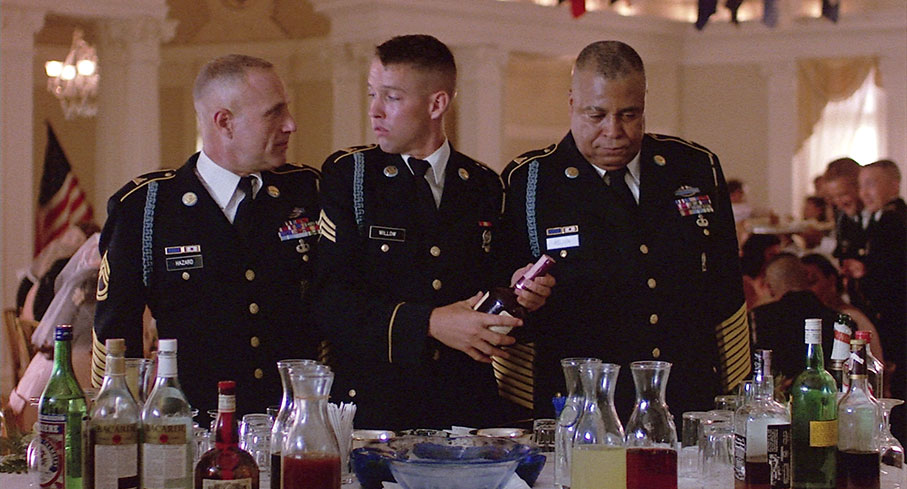
If I was still left with the feeling that overall Gardens of Stone is a little less than the sum of its parts, I can also appreciate how involving and enjoyable many of those parts are. Just about any scene in which James Earl Jones appears has its specific pleasures (his delighted, wide-eyed "Yum, yum, yum" when preparing to inspect Wildman's kit makes me laugh out loud every time I watch it), and there are character scenes that work so well as entertainment – the tagging of Jackie's sergeant's stripes is a good example – that you almost forget you're watching creatively dressed-up plot development. Technically, it's close to flawless. The clean formalism of Jordan Cronenweth's cinematography feels absolutely right for a film in which ritual and precision are paramount, and while it does occasionally add an artificial edge to an emotional scene that would have played better without musical accompaniment, Carmine Coppola's brass band score is generally effective. It's also intriguing to see a director of Coppola's standing and reputation in such restrained and even melancholic mode, though it's hard to shake the feeling that the sometimes downbeat feel was shaped in part by the death of his son Gian-Carlo so early in the production, a tragic event that has echoes in the film that weren't lost on the filmmaker.
That the film is prepared to aim high by exploring a number of issues – including death, loss, loneliness, friendship and the tragic and wasteful nature of war – is admirable in itself, and while it doesn't tackle any of these themes in the sort of detail they probably deserve (and indeed have received elsewhere), collectively there is enough story and character meat for the various strands and themes to effectively register. The result may not be one of Coppola's greatest film achievements, but it's still a well-made, impressively acted and non-polemical anti-war drama that dares to whisper its message instead of shouting it from the pulpit.
A very strong 1.85.1 1080p transfer from a Sony HD remaster that boasts an impressive level of fine picture detail, naturalistic colour and well-balanced contrast, with beefy black levels that do suck up some detail but seem to have been lit with that aesthetic in mind. As expected, the picture is consistently clean of dust spots, and a fine film grain is evident throughout.
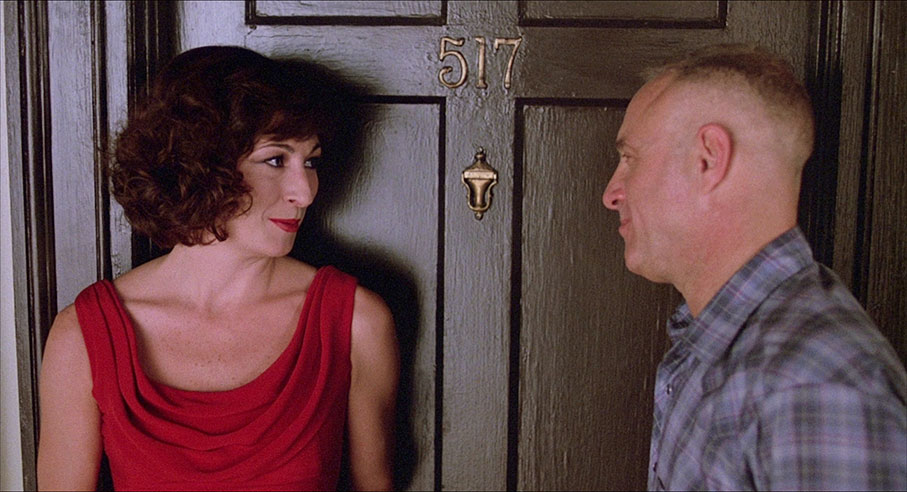
The Linear PCM stereo soundtrack is one of the best non-Dolby/DTS tracks I've ever heard in a long while. The dialogue and music are both clear and well mixed, but it's when the ceremonial guns are fired that the track really shows its colours – the boom of the cannons is so loud and clear and so punchy in its bass that you almost feel as if you are at the location standing right next to them.
Optional English subtitles for the deaf and hearing impaired are available.
Francis Coppola: War at Home (16:15)
A newly shot interview with Coppola, who has some very interesting things to say about the film even though he admits halfway through that he can't remember very much about it now. He states up front that in his view a true anti-war should not glamorise any aspect of conflict or present it as exciting entertainment, and even shares an interesting proposal for a modern anti-war film set in the Middle East. He talks about his long-standing working relationship James Caan and hints at how the actor's personal problems had led to difficulties on the shoot, how the cast of a film can become like a family, how he resisted the pressure to cast a more traditionally glamorous actress in the Angelica Huston role, and more. He also talks about the death of his son and his decision to return to work to avoid wallowing in grief at home, and intriguingly reveals that his beard turned white overnight.
Audio commentary with Jim Hemphill
Filmmaker and critic Jim Hemphill is up front about his admiration for this film and Coppola's directorial skills, but keeps his enthusiasm to a level-headed minimum and instead focuses largely on providing information on the filmmakers, the actors and the process of getting the film to the screen, all in fascinating detail. He also supplies info on locations and the cooperation the filmmakers received from the army, and he has some interesting observations about the ways in which Coppola was ahead of the game when it came to how the filmmaking process would evolve.
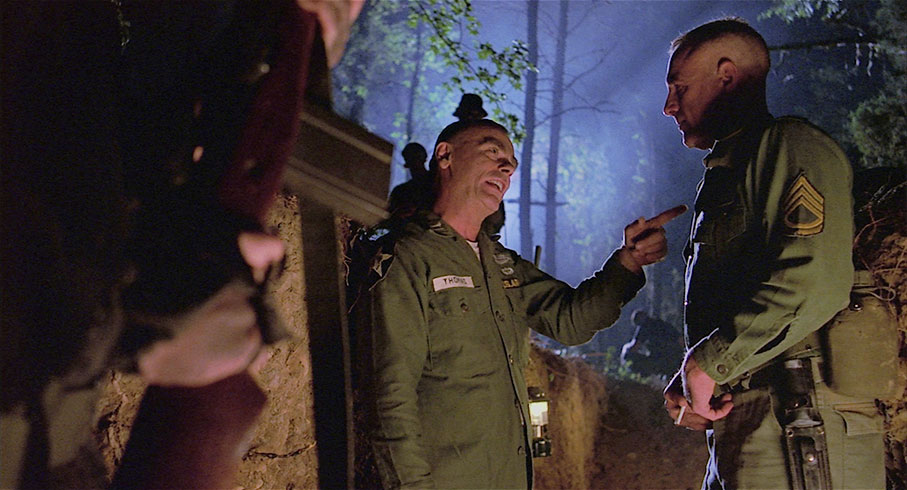
The Guardian Interview with Anjelica Huston (64:24)
An audio-only recording that runs under the film, this is a most enjoyable and educational inclusion. A lively Huston answers questions from the audience and the easily-prompted-to-laughter host on her early memories of her father as a filmmaker (you don't seriously need me to name him, do you?), being on the set of Moby Dick, being put off acting by bad reviews for her performance in her father's A Walk with Love and Death, her relationship with Jack Nicholson and doing small roles in his films, the inception and making of Prizzi's Honor, memories of shooting The Dead (there's a lot on this) and its emotional impact on her, doing voices for audiobooks, directors she admires, getting to know her grandfather (again, you shouldn't need me to name him) solely through his movies, and much more. She has a funny story about Woody Allen's famed neurosis, and while she says she'd love to come to London to do a play, she admits that she does little theatre due to serious stage fright.
Theatrical Trailer
Captures something of the flavour of the film but not a particularly persuasive sell.
Image Gallery
A surprisingly lightweight 9 stills and a single poster, all in crisp HD.
Booklet
Following the usual credits for the film, we're treated to a really well argued essay by Neil Sinyard, who picks up on a some of the gripes that I had and adds a couple that I didn't cover, but like me still finds much in the film to admire. Next we have extracts from interviews with Francis Coppola in which he talks about the film, all of which were conducted while it was still fresh in his mind. This is followed by snippets from interviews with James Caan, Anjelica Huston, James Earl Jones and D.B. Sweeney, and bringing up the rear are extracts from three contemporary reviews.
There will be those who champion Gardens of Stone as one of Francis Coppola's strongest and most undervalued works and I have no problem with that – as ever, what does quite click for me will prove hugely satisfying to others, and vice versa. It certainly served as a useful reminder to give any film you're not sure of a second or third chance, which in this case proved revealing and allowed me to better appreciate what this one does well. I've no issue at all with Indicator's Blu-ray, which has a first-rate transfer and an excellent PCM soundtrack, and while the extras are small in number, they're of a very high quality. A very easy disc to recommend.
|